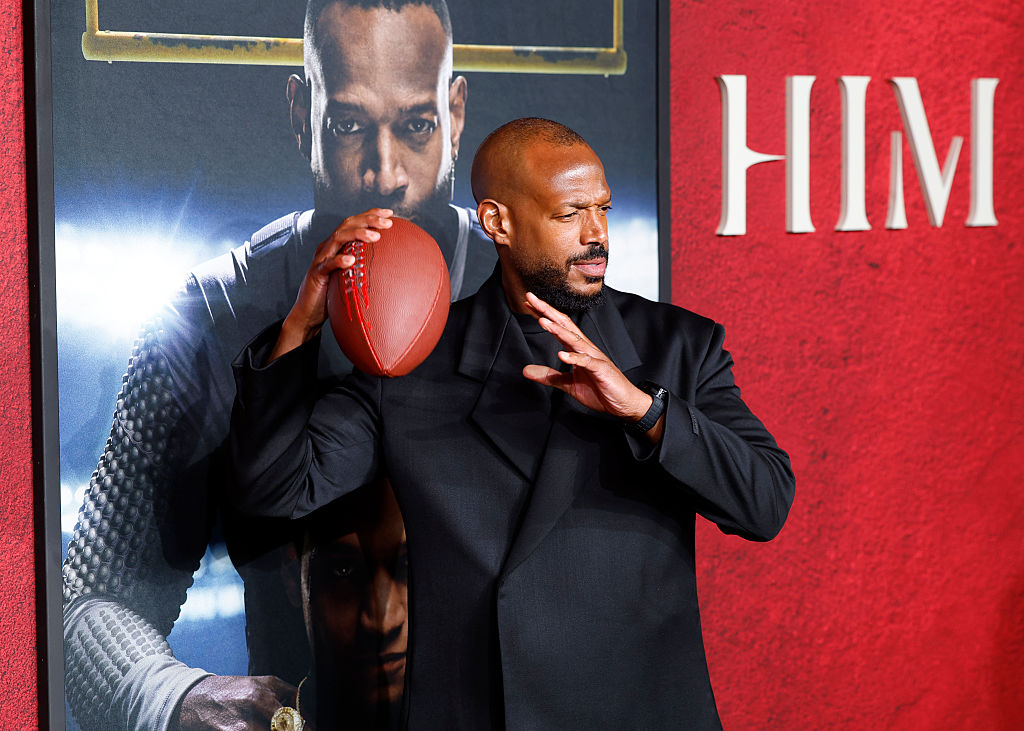‘Him’ And The Limits Of Social Horror Movies


[Warning: Full spoilers for “Him” below]
“Him” was one of my most anticipated movies this year. Jordan Peele’s filmography, both as a director and producer, has been fairly consistent. I was excited to see Marlon Wayans take a crack at horror, and the world of professional sports seemed rife for some horror shenanigans. This should’ve been a layup, right? Unfortunately, “Him” is the cinematic equivalent of watching your favorite football team turn a game-winning field goal into a “doink.” Instead of leaving me grappling with the ideas at the heart of the film, it left me thinking that social issue movies may need to expand into more genres beyond horror.
“Him,” directed by Justin Tipping and produced by Jordan Peele, follows Cameron Cade (Tyriq Withers), a college football phenom getting ready for the USFF’s (the movie’s equivalent to the NFL) combine. He suffers a traumatic brain injury in the film’s opening moments, which has rendered his ability to perform in the combine questionable. His agent (a delightfully slimy Tim Heidecker) tells him that he’s managed to set up a quarterback camp with Isaiah White, a veteran quarterback that Cameron has looked up to since childhood. Cameron takes the offer, and from there, weirdness ensues.
Let’s start with the positive. Marlon Wayans gives a performance, y’all. He proved long ago that he was capable of dramatic work in “Requiem for a Dream.” In the 25 years that have followed that film’s release, Wayans has been given few too many opportunities to showcase his full versatility as a performer. As veteran quarterback Isaiah White, Wayans is a force to be reckoned with. At times, he feels like a ball-busting big brother to Cameron. In other moments, he oscillates between a frightening intensity and deep vulnerability. Wayans is asked to strike an incredibly tricky tonal balance, and he makes it look easy throughout the film’s 90-minute runtime.
Across the board, the actors are doing their best with the material. Tyriq Withers is serviceable as Cameron Cade. While he spends most of the movie either scared, angry, or confused, Withers does bring some depth to the character, particularly in a scene where he’s reflecting on the death of his father and how that’s impacted him.
The set design is striking, with the brutalist architecture driving home the idea that fame is a gilded cage. Kira Kelly’s cinematography, while a little too contrast-heavy for my taste, does a solid job driving home the film’s oppressive vibes.
I waited a week to write this because A) the only way to talk about my issues with it is to dive into spoiler territory, and B) sometimes the movies I dislike upon my initial watch wind up being ones I have a deep appreciation for. I absolutely couldn’t get down with Taxi Driver the first time I watched it in film school, but I found myself unable to stop thinking about it in the weeks that followed.
A movie doesn’t have to make me feel good for me to have a sincere appreciation for what it’s doing. Unfortunately, “Him” will not be joining that conversation.
There are several moments in “Him” when Isaiah’s personal doctor, Marco (Jim Jeffries), is seen injecting Cameron with a mysterious syringe labeled with a shrugging kaomoji. In my opinion, the film’s approach to many of its ideas can be boiled down to that visual.
There are plenty of things to critique about the NFL and professional sports in general. Yet despite being sold as a social horror movie, “Him” has surprisingly little to say about professional football, and the few ideas it does present are vaguely gestured at as opposed to being explored in depth.
I’m a football fan. I’ve played in a fantasy league with my best friends for over a decade, I spend my Sundays watching NFL Redzone, and I have a seriously toxic relationship with the historically underperforming Arizona Cardinals (they’re my home team and I refuse to bandwagon with any other team on principle). Despite this affinity for the sport, I’m very clear-eyed about the inherent issues of the NFL.
It’s a league built on the exploitation and destruction of Black bodies. The same league that blackballed Colin Kaepernick out of the sport under the premise that there’s no room for politics in the NFL held moments of silence for Charlie Kirk, a conservative podcaster who had some very troubling beliefs. The NFL Combine itself feels uncomfortably like a modernized slave auction. There is so much material that could be mined for an effective horror film, and “Him” seems to be woefully uninterested in any of it.
It kind of gestures at the toxic, parasocial relationship between athletes and their biggest fans, but the issue is broached in two scenes and goes away. It gestures at the absurdity of the combine outweighing the years of work an athlete puts in to get there, but doesn’t go anywhere with it. Isaiah seems to be struggling with the idea of giving up his role as QB 1, but we don’t really get insight into what the position means to him and why he’s so determined to hold on to it.
This lack of commitment to any idea can be seen in the film’s climax. Isaiah and Cameron get into a brutal fist fight that ultimately culminates in Cameron apparently killing Isaiah to take over the QB 1 spot. The team owners hold a cultish ritual, essentially asking Cameron to sell his soul to become the next pro football great. Instead of signing the contract, Cameron violently murders all the team owners.
The finale seems to call back to a quiet moment between Isaiah and Cameron, when Isaiah tells him not to take greatness the way he did it. To find his own way. Cameron technically does, I guess? The callback would be more effective if Cameron chose not to kill Isaiah. If he found a way for both of them to escape whatever weird cult is operating this football operation.
Instead, the movie tries to have it both ways, resulting in a climax that’s both confusing and underwhelming.
The football of it all weighs very little into the horror, which begs the question: why make this a social horror movie?
The horror trappings wound up hurting “Him” more than helping it. Anytime the movie approaches an interesting idea, it immediately tries to find some bizarre way to scare the audience. This problem is compounded by the fact that most of the horror elements fall flat. I was never really scared, just often confused at what I was looking at and how we got to these scenarios. The movie can’t even argue that it exists in a space of ambiguity, as Cameron’s agent literally explains everything that’s happened during the movie in an effort to convince him to sign the contract in the climax.
In interviews, Justin Tipping has said that the core theme he kept coming back to for “Him” is “what are you willing to sacrifice for success?” Which is an interesting idea, but the film only takes a surface-level approach to it. The concept of sacrifice is never given real, personal weight for Cameron or even Isaiah. It feels like it’s just there to allude to some of the weirder, cult stuff going on with the team owners.
I couldn’t help but keep thinking of Oliver Stone’s “Any Given Sunday” while watching “Him.” That film is a surrealist drama set in a fictional football league that follows the conflict between a veteran QB and the young upstart who’s outshining him. In addition to focusing on the sport, the movie manages to be clear-eyed and critical of the NFL while also having a deep admiration for the sport itself.
“Any Given Sunday” says more about the messy, dark heart of professional football in a dinner scene than “Him” does in its entire runtime.
I understand that social horror has become a popular vessel to talk about social issues in the wake of “Get Out.” But with movies like “Him,” “Antebellum,” “Don’t Worry Darling,” and “Opus,” it’s becoming clear that the horror/thriller trappings can wind up overpowering the core ideas to the point that you get movies that are more concerned with cultivating a vibe than exploring interesting themes.
We live in dark times, and art can be an effective tool against authoritarian attitudes. Genre film in particular is a fantastic way to talk about real-world issues in a way that can disarm the audience and get them to consider perspectives they wouldn’t otherwise. Jordan Peele has used horror to talk about race to great effect in films like “Get Out” and “Candyman (2019).” Not everyone is Jordan Peele, though. After seeing “Him” and so many social horror films try and fail to be a Jordan Peele joint, maybe it’s time to start exploring other avenues.
SEE ALSO:
Why Is It So Hard To Watch ‘Highest 2 Lowest’ In A Theater?
Black Men: We All Need To Get On Da Gild
What's Your Reaction?
 Like
0
Like
0
 Dislike
0
Dislike
0
 Love
0
Love
0
 Funny
0
Funny
0
 Angry
0
Angry
0
 Sad
0
Sad
0
 Wow
0
Wow
0






























